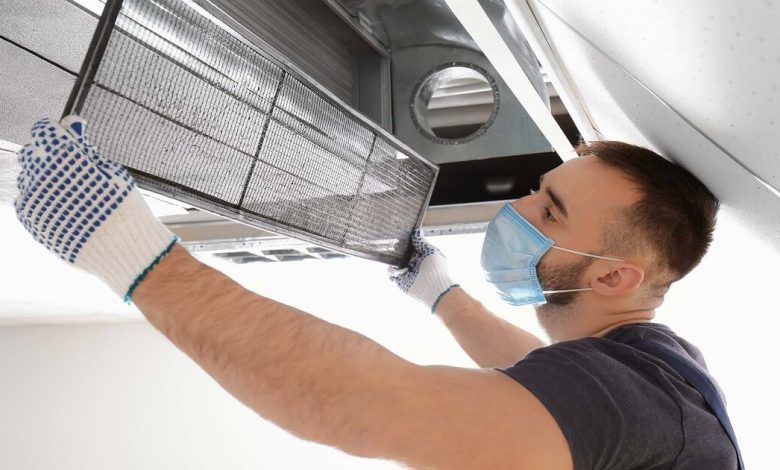Checklist That HVAC Companies in Pakistan Use For Analysis

Last Updated on March 29, 2024 by Ali Hamza
Although it is necessary to get your system checked by the best HVAC Companies in Pakistan, there are ways that you can use to do minor maintenance yourself and save costs. Use this checklist that professionals use to do minor maintenance yourself.
Besides lighting, HVAC systems remain the largest energy consumer in commercial buildings. While there are many practical ways to reduce energy consumption, preventive maintenance of HVAC systems is one of the cheapest and most effective ways to maintain performance, reduce costs, and extend system life.
This article outlines five simple steps to maintain your HVAC system.
Commercial HVAC Maintenance Checklist
Some maintenance tasks should be reserved for HVAC Companies in Pakistan, but many others are straightforward. So building maintenance personnel can play an essential role in the maintenance and efficient operation of HVAC systems. With that said, here are some of the most manageable HVAC maintenance tasks you can do.
Replace The Air Filters Regularly
Filters must be in good condition so air can flow efficiently through the system. Failure to do so may restrict airflow, forcing the system to work harder and use more energy.
Dust, dirt, and other small particles are common causes of clogged filters and dirt, so if you have a particularly “dirty” activity in your building, such as manufacturing or production, clean the filters regularly. The examination is more important.
Ideally, it is best to replace the filter as soon as it becomes visibly dirty, and it is recommended to check at least every three months, but more often, if necessary, it will not cause any damage.
Visual Inspection Of The System
A quick visual exam may seem obvious, but it’s less common than you think.
Construction engineers and managers often don’t check until after the system has failed. In many cases, you could have stopped these costly failures much earlier if they were fewer problems and potentially less expensive to repair.
A visual inspection checks all major and minor components of the HVAC system and looks for signs of something wrong. This includes cut pipes, rust, leaks, and dirty refrigerant lines. Checking the nozzles is also very easy. It should be clear and free of leaves, sticks, mold, or anything else that could cause a blockage. Also, ensure at least 3 feet of clearance between heating and cooling equipment.
Recalibrate The System Semi-Annually
Commercial property owners are advised to reset their HVAC systems before winter and summer to anticipate moderate increases and decreases. You will also need to adjust the thermostat settings to reflect this change. These minor adjustments may seem trivial but can lead to significant energy and money savings.
Has the use and occupancy of certain parts of the building decreased? Shift patterns changed? Review these types of questions regularly. Although you may have programmed the HVAC system settings before, it is a good idea to double-check that the settings are appropriate for your building’s current use.
Inspect and Clean Drain Lines
Furnaces and air conditioners generate steam during operation. They must be efficiently discharged outside the building to avoid structural damage.
This condensation typically accumulates in an external collection tray via the drain line, where it naturally evaporates into the air. Over time, this water tray naturally attracts microorganisms such as bacteria, algae, and mold, all of which produce byproducts that can lead to blockages in the system.
Plus, the tray can overflow and damage things if it’s not emptied regularly. Therefore, it is necessary to check whether everything is working as it should periodically. Drain lines are clean, collection troughs do not overflow, and condensate evaporates as needed.
Cleaning the AC evaporator and condenser coils
The evaporator and condenser coils are exposed to circulating air during operation. This air is not clean. This means that dirt, fungus and mould can build up over time and significantly impact efficiency.
For this reason, you should clean the coil at least once a year. This can be accomplished using many commercially available coil cleaners and compressed air.
Unlike the other tasks listed above, many building engineers prefer to leave this task to professional HVAC Companies in Pakistan.
Professional HVAC Companies in Pakistan
While there are many tasks that regular maintenance personnel can perform, others must be handled by a professional HVAC Companies in Pakistan. This includes comprehensive diagnostics, maintenance, replacement and repair when necessary.
Energy Star recommends scheduling pre-season professional service and maintenance twice a year. The best time to do this is before winter and summer. This will ensure that everything is in place before peak HVAC demand begins.
Regular maintenance by a professional HVAC Companies in Pakistan not only gives you peace of mind that your system is safe, but it also benefits you that your system is operating at maximum efficiency, resulting in significant savings and optimum performance year-round.
How do you evaluate an HVAC contractor?
When it comes to evaluating an HVAC contractor, there are a few key factors to consider. Firstly, you want to make sure that the contractor is licensed and insured, as this will provide you with a sense of security in case anything goes wrong during the installation or repair process. You should also look for a contractor who has a good reputation within the community, as this can be a good indication of their level of expertise and reliability.
Another important consideration is the contractor’s experience and training. It’s important to look for a contractor who has extensive experience in the HVAC industry, as this will ensure that they have the skills and knowledge necessary to handle any issues that may arise during the installation or repair process. Additionally, you should inquire about their training and certifications to make sure that they are up-to-date with the latest industry standards and practices.
Finally, you should also consider the contractor’s communication and customer service skills. A good contractor should be able to explain the installation or repair process to you in clear and concise terms, and should be willing to answer any questions or concerns you may have. They should also be responsive and timely in their communication, as this can be a good indication of their level of professionalism and commitment to customer satisfaction.
Overall, evaluating an HVAC contractor requires careful consideration of a variety of factors, including licensing and insurance, reputation, experience and training, and communication and customer service skills. By taking the time to evaluate these factors, you can find a contractor who will provide you with high-quality service and ensure that your HVAC system is operating at its best.


